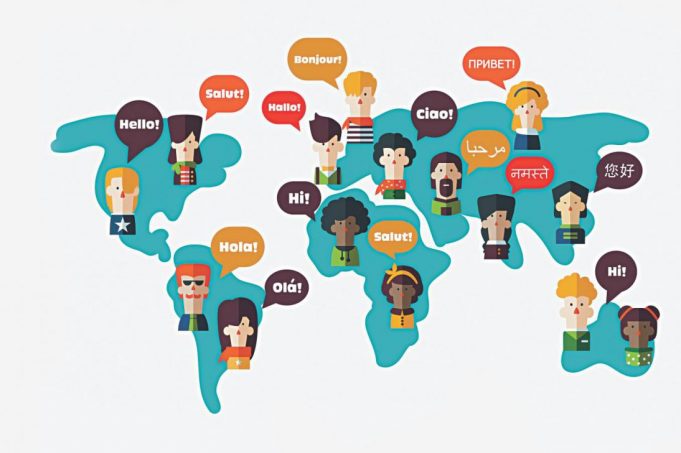Someone once said that ‘speaking one language sets you in a corridor for life. Two open every door along the way.’ In a globalized world where people are able to connect with each other in a matter of seconds, regardless of each other’s location, and where businesses are able to trade without borders with markets and consumers based abroad, the sentence couldn’t be any more relevant.
Learning a new language, whether for business or personal use, such as communicating with friends or family, brings along a number of opportunities and benefits. Although this requires motivation and persistence, the results are always worth the effort.
Job Opportunities

Looking at the statistics, it’s clear to see that bi-lingual people, or people who speak more than 2 languages, are not only able to find jobs more easily, but they are also paid more on average.
Being able to speak more than one is an obvious advantage in such a globalized world, where companies deal with international partners and customers on a daily basis.
Employees who are able to fluently communicate in more than one language are considered a great asset to any company, not only due to the fact that they can help in direct communication with foreign customers and business partners, but also because, in most cases, speaking a second language brings with it the cultural awareness and knowledge, which can be extremely beneficial within an international business.
But are all languages equal in the business world? Unfortunately, they are not.
In some cases, businesses and organizations prefer to work with people who are able to communicate in the native language of the company’s target market. For example, if you work for a company within the automobile sector that deals with the German market, speaking German would be quite an obvious advantage.
In other cases, the preferred one is determined not by the company itself, but by the market. In the aviation industry, apart from English, French is the other main language – similarly to the medical sector. Chinese mandarin, on the other hand, would be a preferred one by many employers simply due to the market’s growth prospects.
What about a number of speakers?

A company can perceive the value of a language based on a number of factors, such as the ones mentioned above. Yet, another important aspect a business may consider when looking for people to work with is the overall, world-wide number of speakers of the one in question.
For example, English is the most commonly spoken language in the world, taking into account both native as well secondary speakers, and so employers around the world may consider people who are able to speak it a great asset to their company.
Spanish and French are two languages that are the official in the largest number of countries around the world. Especially Spanish, which can be found as an official tongue practically on every single continent, from Europe to the Americas and Africa.
Additionally, those like Spanish, French and even Portuguese have a large number of speakers specifically in fast-developing countries and markets. A potential employer may look favorably at a person who is able to speak these languages as it will allow them to communicate with business partners, associates and clients should the company expand into one of these countries in the future.
Although many organizations search for people who are able to speak these popular languages, it may also be a good idea to learn one which is less popular. As speakers of those such as Russian, German, Polish or Japanese are less common, but the economies in these countries are fairly strong, and learning one of these may be a fantastic opportunity to stand out within a competitive market and a pool of potential employees.
Career in translation services?

A great example of this could be the translation industry, where speakers of rare languages are oftentimes busier due to the lack of competition from other linguists. A representative of one of the fastest-growing London-based agencies specializing in providing expert translations in the United Kingdom, translationservices24, have told us that “linguists who specialize in translations for niche markets and rare language pairs are extremely valuable for any translation agency.
TS24 works with over 2,000 professional translators, but some languages are more difficult to work with than others, simply due to their availability. Interpreters and translators who are experts in not-so-common ones are generally busier than others, simply because of the shortages in linguists available within their particular language pairs.”
More benefits of learning a language
Although learning can have a positive effect on your professional life and your career directly, it additionally entails benefits which can indirectly help you within a corporate environment.
Many studies and experiments based on human psychology have found that the brains of people who are able to speak two or more languages operate differently to those speaking only one.
Better decision making
A study by the University of Chicago found that people who speak more than one language fluently are better able to pick up small nuances. Such a heightened understanding of complex situations leads to much more rational decision-making.
Improved memory & focus

A study published in ‘The Journal of Experimental Child Psychology’ found that bilingual children performed much better in tasks using their working memory, which is responsible for short-term processing of information and memory storage. The assumption of the study was that knowledge of more than one language contributed to their better working memory.
Stronger ability to multitask
Bilingual and multilingual people, especially children are skilled at switching between two different types of speech, writing and language structure. According to a PSU study, this allows them to grow up as good multitaskers.
In the study, participants used a driving simulator while doing separate, distracting tasks at the same time. The investigation found that people who spoke more than one made fewer driving errors.
As you can see, learning a foreign language, although requires motivation and a lot of effort, brings a number of direct and indirect benefits to your life, both personal and professional. From being able to stand out from a pool of competitors during the hiring process to higher average pay and improved memory or multitasking skills.









